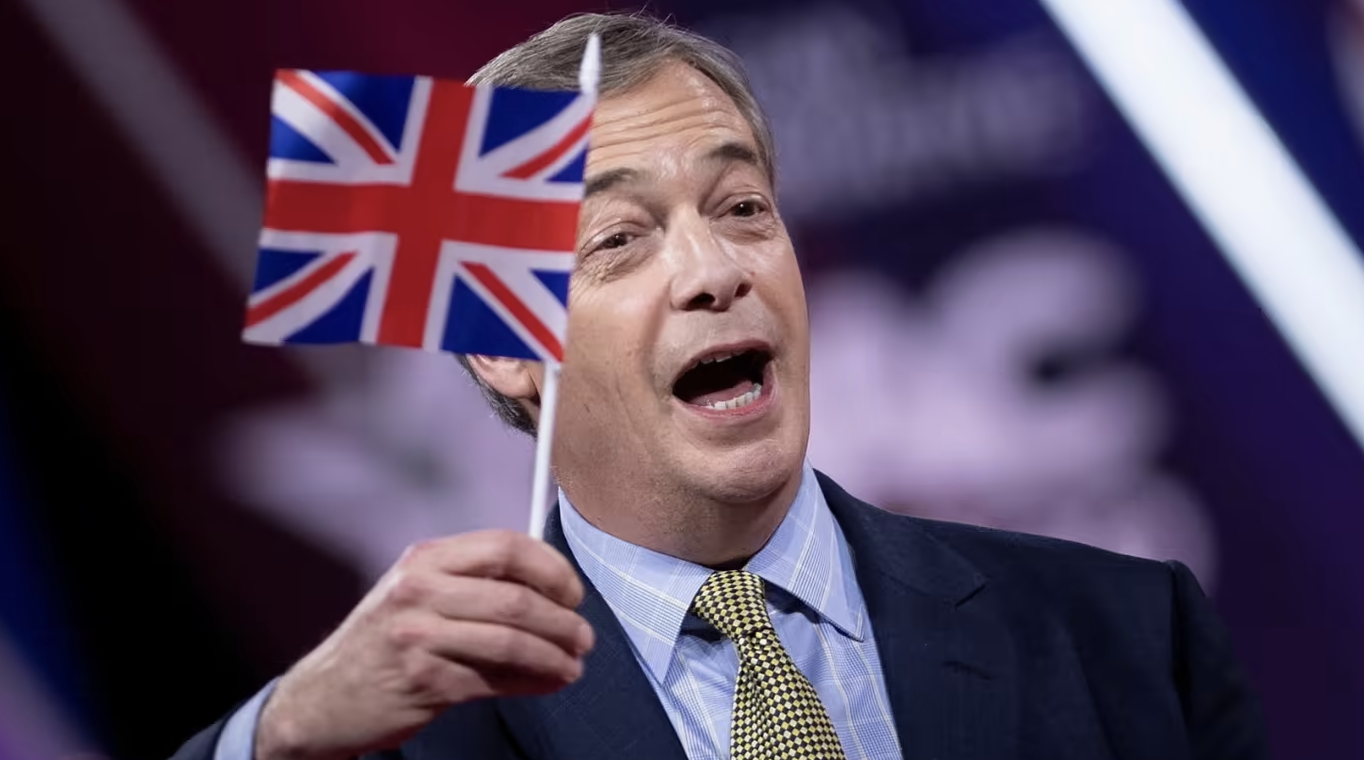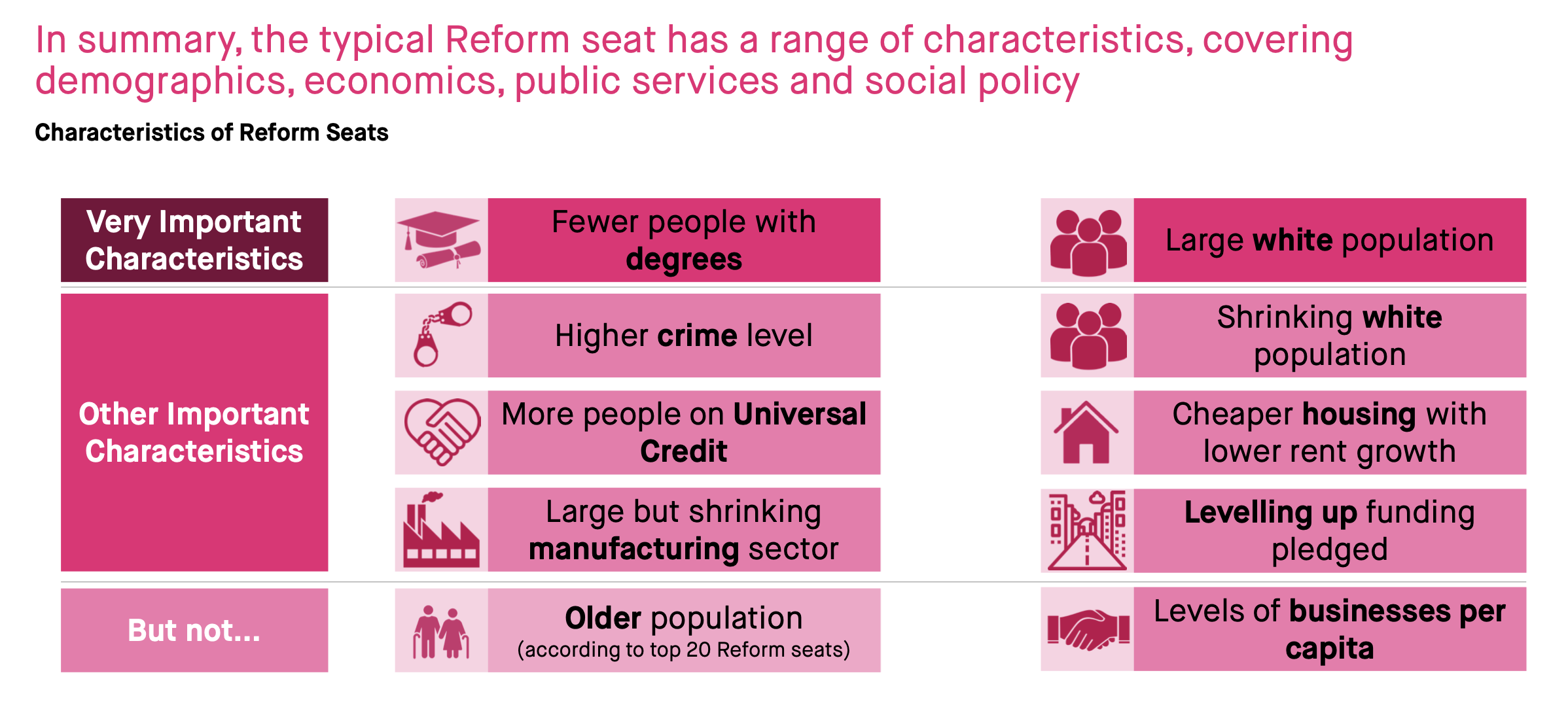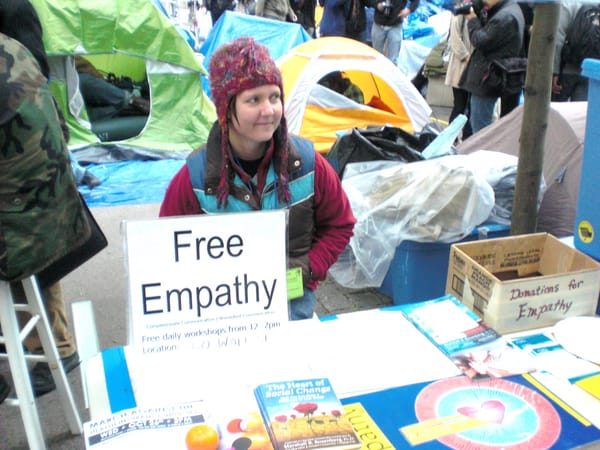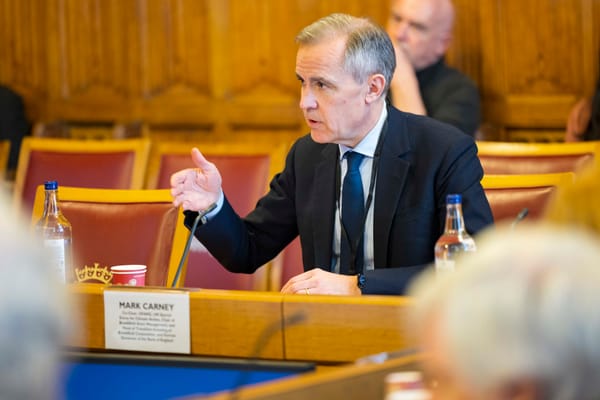Nigel Farage: a uniquely British witness?
A play about the Russian invasion of Ukraine makes us reflect on the symbolic role that Nigel Farage is performing on Britain’s stage.

In Dash Arts’ new play The Reckoning, co-written and directed by Josephine Burton, there’s a moment when a journalist is trying to persuade a witness to speak about his experiences of the Russian invasion of Ukraine.
The journalist tells The Man from Stoyanka, who stayed rather than fled when the Russians invaded, that it’s vital to collect his testimony for use in criminal proceedings; that he is a “unique witness” to the atrocities.
This phrase – “unique witness” – has stayed with me from what was a dazzling play. Like all excellent art, The Reckoning moves you to think not just about the art but the world. It is hovering over my thoughts in relation to the work we at Absurd Intelligence are doing with others (such as Unchecked UK, NEON, and many more), to think about the rise of Reform and Farage.
During The Reckoning, the stories that the audience hears are moving in large part because we know that many come directly from real witnesses. They are verbatim testimony to deaths, torture, random suffering, helplessness, shame. Around the audience, older Ukrainians hid behind their hands; a younger woman wept. The actors told their actual stories of fleeing the war. A Belarussian poet reminded us of how writing in her own language would have got her murdered.
This unique witness testimony moves us. And my hunch is that Farage is playing the role of a “unique witness” for the state of Britain today. Perhaps not as poetically as in The Reckoning; but a unique authenticity as witness – telling it as it is – is crucial to his performance.
The performance of Nigel Farage
Why do some people trust Farage, despite his regular lies? Why do some people loathe him despite his truth-telling? Why has BBC Question Time platformed Farage on 36 occasions since 2000 (the ninth highest)? Will Faragski’s love of Crypto and Putin undo him? What does he symbolise for our myth of Britain that others can’t?
It is useful, I think, to see Farage in a role. That’s even when he tells – especially when he tells – made up things, or hints at supposedly hidden things. The same goes for his chief party podium communicators, such as Ann Widdecombe and Matt Goodwin, although they are more Jester and Fool in this court.
Farage is not King, though, as much as he wants to be. He’s playing another role. Jolly Prince Gold Bullion, pretender, soothsayer, rabble rouser; the one who will speak a plain truth; not in racist riddles as JesterAnn or Foolwin do, but as someone capable of tearing down the kingdom. As Rafael Behr writes:
Farage has seized the mantle of radical changemaker, at least in that corner of the political market where change implies tearing down institutions and breaking rules without much thought (or honesty from the leader) about what might replace them.
Yet symbolic truths are sometimes more powerful than truth. That’s why, perhaps, writers find faithful but dramatised ways to communicate witness testimony from atrocities. Think of Svetlana Alexievich’s Chernobyl Prayer where she made a new form for testimonies of survivors of disaster; or Hannah Arendt’s Eichmann in Jerusalem.
So, let’s think of Farage not as King or Hanged Man or Nigel the Profit, but as playing the role of Unique Witness.
Unique and witnessing
Why Unique? With Boris’s demise, no-one occupies the same ground. Farage offers a unique combination of patriarchal, blokeish, direct, funny, uncowed, no-nonsense, jowelly, freedom-loving, mind-your-own-business, go-getting, town and country, wealthy. People see him as a successful Brit with grit; not someone they need to be – leave it to Fagdy! – but someone to have a pint with down the pub.
Why Witness? Because people believe he’s been through the wringer, that he’s stood up for Britain to Europe inside the belly of the beast (like George and the Dragon), and can speak of the pains, sufferings, frustrations, and hurts of The Unheard, the majority of British people who don’t trust normal politicians and who don’t think politicians listen.
The Unique Witness is a combination of the people and the kingdom. Trusted to be authentic, or – sometimes – authentically wrong. When Farage spreads misinformation as he did around Southport, it is in service to a deeper vein of truth: the people are not listened to, and the elites keep things from them. His performance as witness is in service to Britain even if his testimony is proved to be wrong, or lies. They’re the fictions that tell a deeper truth.
For that, Farage doesn’t only channel feelings but direct them. Most people aren’t actually anti-Net Zero. But when Farage attacks Net Zero, 30% more people turn against it as an idea or set of policies. He is the Unique Witness who people believe knows more than they do about the state of Britain, and so follow his lead, despite record heats in June, despite 80% of farmers, who love Farage, fearing the climate crisis will harm their livelihoods.
The power of a symbolic leader
There is something immensely politically powerful in this symbolic national role that Farage is playing as the truth-teller, as Trump played in the States. It’s why Trump called his platform Truth Social. Farage is understudy to Trump.
It is something the alternative side (call it the Left) wholly lacks right now. We got close for a while with Mick Lynch (for whom we should all be grateful). Many Labour voters preferred straight-talking Andy Burnham to Keir Starmer for Labour leader, before Keir won out; they prefer Burnham to replace Starmer for the next general election.
A survey of former Red Wall Labour voters said the three people they thought of, in culture, to be the next PM would be Tim Martin (Wetherspoons), Alan Sugar, and Martin Lewis of moneysavingexpert.com. Most of this is because of their straight-talking common sense. They are, more to the point, key witnesses to life in Britain: saying it like it is, who aren’t ripping you off. They’re all known for directness, no bullshit.
And they’re all old white men. Which shouts pretty loudly that it is a role that is being played, and culturally we have a very rigid idea about who can play that role.
But Farage is the most unique amongst them. He’s taken over from Boris ‘Where’s My Fridge’ in the lead role as the ‘great man’ of British politics. To do that, he honors to uphold a critical value: that of directness.
Directness – a British value
“Calling a spade a spade” and making direct common sense calls (especially from the point of view of personal witness) is what Johnson strategically embodied, up to the point where his bumbling undid him, and Farage is doing now.
Chris Clarke wrote a big paper on this in 2022 (Thinking in Straight Lines) as analysis of Johnson’s rhetoric, but which also mapped the dividing shift over the last 30 years of where votes have gone in Britain.
Clarke’s premise was this: if Britain has become more liberal, tolerant and ‘left’ overall (e.g. around gay rights, marriage, abortion, even race), why has the ‘right’ so often done better electorally? From 1990-2024 the British Attitudes Survey, YouGov, and other polls, have all shown a more tolerant Britain, even with the rift of Brexit.
The big issue, says Clarke, wot* won for the Tories and now wot wins for Reform is something else; it’s communication style. Specifically systemic vs direct reasoning.
*Wot: old English, as found often in the tales of Robin Hood, meaning ‘to know’ or ‘for all I know’, and used to such great punning effect in The Sun’s front page from the 1992 General Election.

That is, people with more education think more systemically, e.g. about contextual and systemic and structural causes for outcomes, such as social justice; not just crime but the causes of crime, intersectional stuff.
Whereas those with less education overall think more directly: criminals are criminals and should be banged up; ‘take back control’ means leaving the EU good and proper.
Higher education trains people to think in systemic terms. If you don’t go through higher education, or private education, you rarely get exposed to this kind of analytic process of thought to keep digging for root causes, intersecting pressures, abstract reasons.
In contrast, direct thinking means binary distinctions, not complex ones. Appeals to morality in black and white terms, and scapegoating for simple explanations. These appeals work well in politics and especially where people feel under threat or in crisis. Especially in insecure times, direct reasoning feels more intuitive. It’s why Reform’s Dicey Ticey says “what’s all this rubbish about a heatwave, it’s snowing outside!”.
So votes have become divided along education lines: areas with higher attainment of qualifications, e.g. degrees, swing and vote Labour; and lower attainment and no degrees, swung and voted Tory. And now Reform. This tallies with the Social Market Foundation research in April 2025 that showed the two major factors in Reform vote are “no degree” and “large but shrinking white population”.

Communication style, not brains
Associate Professor of Political Communication at Leeds University Lone Sorensen confirmed for me in a conversation that this correlates with a lot of published studies that show lower levels of educational attainment lead to political success for populists; it holds for Trump, as well as the AfD in Germany, also Le Pen in France, and others.
Farage performs the same appeals and direct reasoning. Simple cause = simple effect.
But, less education doesn’t mean low cognitive ability. It isn’t that populist supporters are stupid. It is about the communication style and form. As Sorensen told me, the better correlation is not with education but with anti-elitist attitudes.
And this is why it’s useful to think in terms of roles, performance, and plays.
Constructing the political players
Because it is a performance. Farage and Reform, like other populists, construct the crisis which they then can perform to and polarise around. They construct a narrative which always provides clear binary ‘sides’ – British people vs. immigrants on small boats – because, and it’s worth emphasising:
When this form of argument or rhetoric becomes dominant, they always do better than the left.
Reform creates the conditions in which their communications will work. It isn’t actually reality on the ground. It’s a constructed story. A play, if you like.
Farage can be trusted to perform directness, even by simply having a pint and fag or cracking a joke. As such, his ‘side’ is seen as the one that is witnessing honestly, Britishly, and having the courage to offer the testimony to the real state of our nation.
(It’s also why Keir Starmer had that glut of writing for The Sun, and why Tony Blair hired Campbell as he was a “tabloid hack” from The Mirror, not from a broadsheet paper. The problem for Starmer now is he’s not a performer.)
Because the majority of people in Britain don’t go through private schools or university, the majority of people in Britain think directly, not systematically. Systemic reasoners – who think analytically, abstractly, often pompously – are the minority. And, they are mostly gathered in cities, not spread across constituencies; and they are seen to dominate elite institutions (the BBC, Brussels).
So what do we do about it?
Directness is a British value. We want people to mean what they say, and not go back on their word. We value straight-talking as a badge of honour.
(Avoiding the subject is also quite British! But a private value, perhaps? Not a public one, such as directness. It’s performed by individuals to avoid confrontation, and that mostly relates to our interpersonal relationships.)
Directness. That’s what we like! In our leaders and our public figures, at least.
Differences between people are being constructed, using standard culture war agendas, to create black and white situations, which Reform can use to appeal in direct style to the majority of the population through direct thinking and direct language.
And that’s the wedge.
It's a communication style. Performance. One that politicians actively, like playwrights, manipulate as a story to be told, and performed by their best, most ‘authentic’ actors.
So it’s crucial to find ways to acknowledge and accept how people are feeling across the country – to bear direct witness to the situation – and then bring people together. We do need leaders who can speak directly to the majority. It’s what people want.
But can we find leaders who speak directly to the stage of Britain but who don’t blame the immigrants? Can we do this without creating ‘sides’?
Our hunch is that people don’t want a racist Britain. People want a fair, straight talking one that has common sense policies in straitened times. That, I’d argue, is fair enough.
Tell me some good news
People also want good news, another thing Farage excels at. Not as a promise of happiness but, and this is why attacking immigrants works, Farage brings good news as vengeance.
There’s another moment in The Reckoning where the two Ukrainian actors challenge each other to tell some good news. They begin playfully but descend into tragic, then horrific stories of the war. Tell me some good news… The ‘good news’ Farage brings in his unique witnessing is this:
I am listening to you, and I will bring you vengeance on those who have made your lives so miserable and betrayed you and Britain. I’ll tear down their kingdom.
One of the things unique to being a witness is that people expect the worst from you, because you’ve seen the worst.
But, truthfully, we prefer plays to actual courts. We will much more quickly believe something we want to hear than the truth, especially when people such as Faragski perform it so well.
Elsewhere in Absurdity
As ever, we’ve been across the country (and others!) to meet, listen, work with and build resilience and local power for the change we need. Wot does that look like?
- All week, Clare has been in Leiden with Julia Steinberger and others figuring out the future of collective climate action (follow Clare’s substack for more analysis for a real democracy and a politics fit to cope with collapse);
- On Tuesday Nuala, Tracey, Charlie and Alex went to do a site recce at Conway Hall for our forthcoming Convention on the Fate of Britain, Sept 11 – if you’re one of the people doing the work to build a better Britain and need to be there with us, drop us a line;
- Also on Tuesday Charlie saw Echo by Nassim Soleimanpour at the Royal Court, a time-and-space-travelling unravelling of what it means to belong. A different actor every night – it was Dominic West on Tuesday (and Speak-Up’s Juliet Stevenson on the long sold-out Saturday!!!). Sell kidneys to see it;
- And also Tuesday Alex also went to Toothill in Swindon to work with volunteers there on opening their community centre, supported by Local Trust, and working with Community Organisers, Camerados and others to bring attention to the brilliant work there and the need for neighbourhoods to have a space where people can come together and make change where they live.






